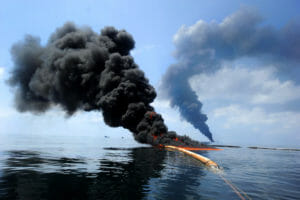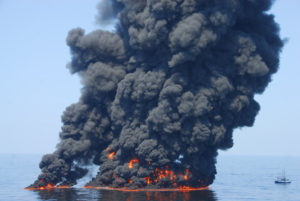Time Magazine Puts Contrarian Spin on Spill
Relying primarily on a controversial Louisiana expert with previous ties to BP but also quoting a leader of the Audubon Society, Time magazine has posted a contrarian report arguing that the environmental damage of the Deepwater Horizon disaster has been overblown.
Relying primarily on a controversial Louisiana expert with previous ties to BP but also quoting a leader of the Audubon Society, Time magazine has posted a contrarian report arguing that the environmental damage of the Deepwater Horizon disaster has been overblown. The thesis is primarily that the coastline has been spared the level of damage the Exxon Valdez wrought on Alaska, and that the ongoing loss of wetlands because of changes to the Mississippi River are a bigger deal. The reporter defends his controversial sources as having been right earlier in challenging the official story of the flooding of New Orleans after Hurricane Katrina.
Your support is crucial...Time.com:
Marine scientist Ivor Van Heerden, another former LSU prof who’s working for a spill response contractor, says “there’s just no data to suggest this is an environmental disaster. I have no interest in making BP look good — I think they lied about the size of the spill — but we’re not seeing catastrophic impacts,” says Van Heerden, who, like just about everyone else working in the Gulf these days, is being paid out of BP’s spill response funds. “There’s a lot of hype, but no evidence to justify it.”
The scientists I spoke with cite four basic reasons the initial eco-fears seem overblown. First, the Deepwater Horizon oil, unlike the black glop from the Valdez, is comparatively light and degradable, which is why the slick in the Gulf is dissolving surprisingly rapidly now that the gusher has been capped. Second, the Gulf of Mexico, unlike Prince William Sound, is balmy at more than 85 degrees, which also helps bacteria break down oil. Third, heavy flows of Mississippi River water helped keep the oil away from the coast, where it can do much more damage. Finally, Mother Nature can be incredibly resilient.
As we navigate an uncertain 2025, with a new administration questioning press freedoms, the risks are clear: our ability to report freely is under threat.
Your tax-deductible donation enables us to dig deeper, delivering fearless investigative reporting and analysis that exposes the reality beneath the headlines — without compromise.
Now is the time to take action. Stand with our courageous journalists. Donate today to protect a free press, uphold democracy and uncover the stories that need to be told.





You need to be a supporter to comment.
There are currently no responses to this article.
Be the first to respond.